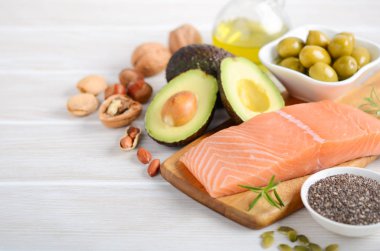Omega-3 fatty acids are essential nutrients that play a crucial role in maintaining overall health.
Despite their importance, the human body cannot produce Omega-3s on its own, making it necessary to obtain them through diet or supplements. In this article, we’ll look into the key benefits of Omega-3 fatty acids, discusses the foods rich in these nutrients, and explores why incorporating them into your diet is essential for optimal health.
Key Benefits of Omega-3 Fatty Acids
Heart Health
One of the most well-known benefits of Omega-3 fatty acids is their positive impact on heart health. Omega-3s help reduce the risk of cardiovascular diseases by:

- Lowering Blood Pressure: Regular consumption of Omega-3s can help reduce blood pressure levels in individuals with hypertension.
- Reducing Triglycerides: Omega-3s are effective in lowering triglyceride levels, which, when elevated, can increase the risk of heart disease.
- Preventing Arrhythmias: These fatty acids can help stabilize the heart’s rhythm and reduce the likelihood of abnormal heartbeats.
- Reducing Inflammation: Omega-3s have anti-inflammatory properties that can help prevent the inflammation of blood vessels, reducing the risk of atherosclerosis.
Brain Health and Cognitive Function
Omega-3 fatty acids are vital for brain health and cognitive function. They are integral components of brain cell membranes and support the transmission of signals between brain cells. Key benefits include:
- Enhanced Memory and Learning: Omega-3s, particularly DHA (docosahexaenoic acid), are crucial for maintaining healthy brain function and improving memory and learning abilities.
- Mental Health Support: Studies suggest that Omega-3s can help alleviate symptoms of depression and anxiety, contributing to better mental health.
- Protection against Neurodegenerative Diseases: Regular intake of Omega-3s may reduce the risk of neurodegenerative diseases like Alzheimer’s and dementia by protecting brain cells from damage.
Eye Health

DHA, a type of Omega-3 fatty acid, is a major structural component of the retina. Sufficient levels of DHA are essential for optimal eye health. Benefits include:
- Prevention of Macular Degeneration: Omega-3s may reduce the risk of age-related macular degeneration, a leading cause of vision loss in older adults.
- Reduction of Dry Eye Syndrome: Omega-3s can help alleviate symptoms of dry eye syndrome by promoting tear production and reducing eye inflammation.
Joint and Bone Health
Omega-3s have anti-inflammatory properties that can benefit joint and bone health. Key benefits include:
- Reducing Arthritis Symptoms: Omega-3s can help reduce joint pain and stiffness associated with rheumatoid arthritis.
- Improving Bone Density: Some studies suggest that Omega-3s can help improve bone strength and reduce the risk of osteoporosis.
Natural Food Sources of Omega-3
While Omega-3 supplements are popular, many foods are naturally rich in these essential fatty acids. Here are some of the best dietary sources:
Fatty Fish
Fatty fish are among the best sources of Omega-3 fatty acids. They provide both EPA (eicosapentaenoic acid) and DHA. Key options include:
- Salmon: One of the richest sources of Omega-3s, providing high levels of EPA and DHA.
- Mackerel: Another excellent source, packed with Omega-3s and other essential nutrients.
- Sardines: These small fish are rich in Omega-3s and can be easily incorporated into various dishes.
- Anchovies: Often used in Mediterranean cuisine, anchovies are a potent source of Omega-3s.
Plant-Based Sources

For those who prefer plant-based options, several foods provide ALA (alpha-linolenic acid), a type of Omega-3 that the body can partially convert to EPA and DHA:
- Flaxseeds: One of the best plant sources of Omega-3s, flaxseeds can be added to smoothies, cereals, or baked goods.
- Chia Seeds: These tiny seeds are packed with Omega-3s and can be sprinkled on yogurt or salads.
- Walnuts: A convenient snack that offers a good amount of Omega-3s.
- Hemp Seeds: These seeds provide a balanced ratio of Omega-3 to Omega-6 fatty acids and can be added to various dishes.
Other Sources
- Algae Oil: An excellent vegan source of DHA and EPA, algae oil is often used in supplements.
- Edamame: This young soybean is not only a good source of plant-based protein but also provides Omega-3s.
- Brussels sprouts: While not as rich as other sources, Brussels sprouts still provide a notable amount of Omega-3s.
Omega-3 for Consideration
Incorporating Omega-3 fatty acids into your diet is essential for maintaining overall health. These nutrients offer a wide range of benefits, from supporting heart and brain health to improving eye and joint function.
By including Omega-3-rich foods like fatty fish, flaxseeds, and walnuts in your meals, or considering high-quality supplements, you can ensure you are meeting your body’s needs for these vital fatty acids. Whether through diet or supplementation, prioritizing Omega-3 intake is a proactive step toward long-term health and well-being.












More Stories
Have You Taken Ginkgo Biloba?
5 Health Benefits of Garcinia Cambogia
Unlock the Power of Your Morning Brew